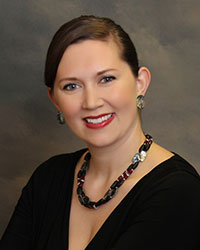
Nichole Maher, Northwest Health Foundation
On the job since: September 2012
Foundation founded: 1997
Geographic scope: Oregon and five southwest Washington counties
Grants made in 2015: $5.4M
Staffing: 10 FTE
How has your career prepared you for your current role?
My most recent role as executive director of Native American Youth & Family Center gave me eleven years of experience in how philanthropy can be a critical partner in a community’s success, and can sometimes perpetuate barriers that impede a community’s progress. These experiences didn’t stem only from the responsibility of finding the resources for NAYA Family Center to thrive. It was also the insights gained from the task forces, committees and work groups, in both public and philanthropic sectors, on which one is often asked to sit. But perhaps most profoundly, it was the everyday connections with members of my community that have so much potential to contribute to our region in phenomenal ways.
What are the most important health issues in your community?
We know that lifelong health stems from some fundamental factors. And we also know that health is far, far more than healthcare — shaping our physical, mental, social and spiritual lives. Too often, these factors are out of our control: our race and ethnicity, our gender, our sexual orientation, our disability. But there are so many opportunities to shape things within our grasp: a safe, healthy birth and childhood, high school graduation and polices that advance equity along racial, ethnic, disability, geographic and other intersections.
What are your core strategies for addressing these health issues?
Our theory of change is centered in building strength and power within communities to advocate for themselves. Communities can use this capacity to change the policies and systems that keep barriers to better health. We also know that if we get childhood right, all the way through high school graduation, then we’ve built the foundation for lifelong health. So we are focused on investing in self-identified communities to build the social and political power to impact better childhoods.
As a foundation with an explicit mission to serve a community, how do you include that community as an integral partner in your work?
We believe that lived experience matters. It’s important that we have board and staff (at all levels of the organization) who know what it’s like to go without dinner, to live with a disability or to identify with Black or Latino, Native or Asian communities. And it’s important that these staff and board members have a track record building, leading and engaging their communities. So we have built a staff and board that reflects our community, though admittedly we still have gaps.
We also have to be reflective. We examine our grantmaking annually and publish a report highlighting how we are (or are not) investing in people of color and people living with a disability. We build meaningful relationships with leaders in communities most impacted by health inequities. And, perhaps most importantly, we hope to lead by following where communities ask us to be.
What’s been a recent big success for your organization and what excites you about it?
We got involved in a legislative effort to change Oregon’s English Language Learner system in our public education. We found it exciting because it exemplified our approach to lead by following. We would not have picked ELL reform as a health issue without community members asking us to. The effort was led by organizations whose community members are most impacted, included those members in their lobbying and decision-making, and we provided support through ongoing lobbying capacity.
What’s the single biggest challenge your organization is tackling right now?
Our region’s decision-makers are increasingly comfortable acknowledging health disparities, and how those disparities continue to fall along racial, ethnic and disability lines. But we are incredibly unable to have difficult conversations about what makes them — and what we need to do to change the systems that fuel these inequities.
What are the most important public policy issues for you this year, and what are you doing about them?
We are supporting a regional approach to raising Oregon’s minimum wage that values workers in every town, but recognizes that costs of living and economic vitality are different across our state. We have engaged rural employers, law makers and others to add a unique perspective to a complex issue. We are also lobbying for a legislative solution that avoids a ballot measure.
Oregon is facing three ballot measures that will make it difficult or impossible for thousands of immigrants and people of color to learn, work and vote in our state. We have joined a broad coalition to fight these measures, but also to engage in a longer-term conversation with Oregonians about the critical contributions—as neighbors, as families, as employees and employers—that immigrants from all over the globe make in our region.
What’s one more question we should ask you, and how would you answer it?
You should ask me: What’s one thing you’ve learned from foundations you admire?
We’ve learned more than just one thing: that we have to focus on strategies that focus on larger systemic policy changes with an equity lens; that advocacy isn’t a dirty word, or even a risky one; that we have to have focus on long-term impact, not short-term outcomes, yet still act with urgency; that we shouldn’t be afraid to call out injustices and the many gaps in our social, economic and political fabric; that we must listen more and lead from behind.
Nichole Maher is CEO of the Northwest Health Foundation, joining us this month for our virtual roundtable with healthcare conversion foundation leaders.